

Can Facebook make you sad? Studies suggest that browsing Facebook can make you unhappy, says Justin Mullins.
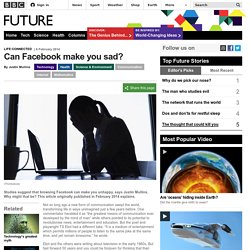
Why might that be? This article originally published in February 2014 explains. Not so long ago a new form of communication swept the world, transforming life in ways unimagined just a few years before. One commentator heralded it as “the greatest means of communication ever developed by the mind of man” while others pointed to its potential to revolutionise news, entertainment and education. But the poet and playwright TS Eliot had a different take. Eliot and the others were writing about television in the early 1960s. Chief among these is Facebook. And yet Facebook’s effects on its users may not be entirely benign. Until recently, few had studied this question and the little evidence that did exist actually hinted that the social network has a beneficial effect. What Would You Give Up For the Internet. Physical effects of internet addiction.
What you need to know about internet addiction. A Balanced Approach To Social Media For Teachers. A Balanced Approach To Social Media For Teachers by Laura Farmer Sitting at night, in front of my computer, I look at my image on Twitter.
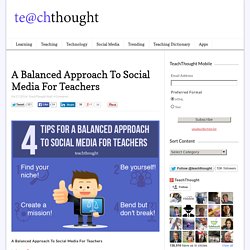
I skim through all my hundreds of tweets. Suddenly, I start to panic. What am I doing? Thoughts race through my mind, and suddenly, I type in the key words–social media and narcissism–in the Google search engine. Call it a moment of weakness, an identity crisis, or just plain craziness, in that moment it all made sense. Over the next week, social media free, I reevaluated. Internet Addiction: A Brief Summary of Research and Practice. Online Social Networking and Addiction—A Review of the Psychological Literature.
1.
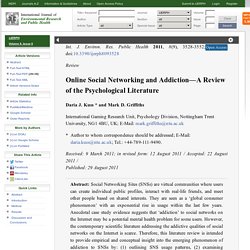
Introduction “I’m an addict. I just get lost in Facebook” replies a young mother when asked why she does not see herself able to help her daughter with her homework. Instead of supporting her child, she spends her time chatting and browsing the social networking site [1]. This case, while extreme, is suggestive of a potential new mental health problem that emerges as Internet social networks proliferate. The mass appeal of social networks on the Internet could potentially be a cause for concern, particularly when attending to the gradually increasing amounts of time people spend online [5].
Social Networking Sites are virtual communities where users can create individual public profiles, interact with real-life friends, and meet other people based on shared interests. Networked learning. Networked learning is a process of developing and maintaining connections with people and information, and communicating in such a way so as to support one another's learning.
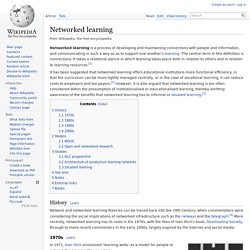
The central term in this definition is connections. It takes a relational stance in which learning takes place both in relation to others and in relation to learning resources.[1] It has been suggested that networked learning offers educational institutions more functional efficiency, in that the curriculum can be more tightly managed centrally, or in the case of vocational learning, it can reduce costs to employers and tax payers.[2] However, it is also argued that networked learning is too often considered within the presumption of institutionalised or educationalised learning, thereby omitting awareness of the benefits that networked learning has to informal or situated learning.[3] History[edit] 1970s[edit]
Thefix. With the recent traumatic news of Danny Bowman, the 19-year-old UK resident who attempted suicide after being obsessed with taking ‘selfies,’ the general public has vocalized strong opinions on both sides of the social media debate.
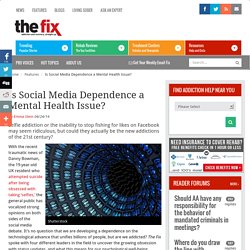
It’s no question that we are developing a dependence on the technological advance that unifies billions of people, but are we addicted? The Fix spoke with four different leaders in the field to uncover the growing obsession with status updates, and what this means for our psychological well-being. “In moderation, social media can be a great way for teens to connect to others, to relate to their peers, and to express themselves,” Dr.
Karrie Lager, a child psychologist practicing in Los Angeles, says. “However, excessive internet use can have serious negative consequences,” she explains in response to a survey published by CASA Columbia. Dr. There is a small minority of people addicted and the good thing is that they can be helped. The danger, Dr. HowStuffWorks "Are social networking sites addictive?" In April 2009, Oprah Winfrey logged on to Twitter and sent her first "tweet," taking online social networking out of the hands of the computer-savvy and into the living rooms of every American.
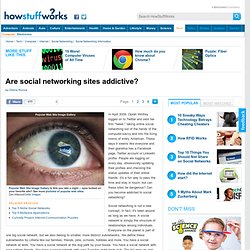
These days it seems like everyone and their grandma has a Facebook page, Twitter account or LinkedIn profile. People are logging on every day, obsessively updating their profiles and checking the status updates of their online friends. Facebook Addiction' Activates Same Brain Areas As Drugs; How Social Media Sites Hook You In. The 2014 social media update from the Pew Research Center showed Facebook continues to be the most popular of the social media sites.
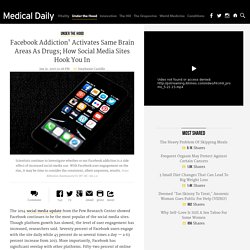
Though platform growth has slowed, the level of user engagement has increased, researchers said. Seventy percent of Facebook users engage with the site daily while 45 percent do so several times a day — a 63 percent increase from 2013. More importantly, Facebook has significant overlap with other platforms. What Is Social Networking Addiction?